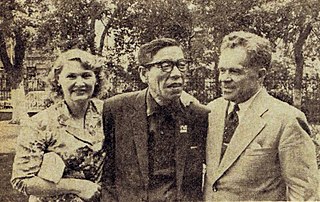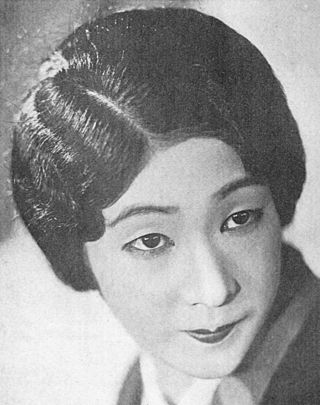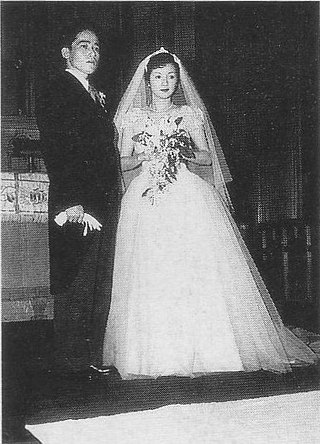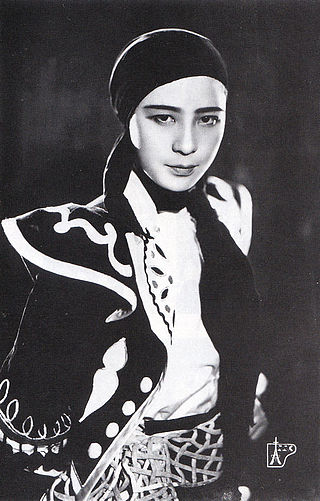
Yasujirō Ozu was a Japanese filmmaker. He began his career during the era of silent films, and his last films were made in colour in the early 1960s. Ozu first made a number of short comedies, before turning to more serious themes in the 1930s. The most prominent themes of Ozu's work are family and marriage, and especially the relationships between generations. His most widely beloved films include Late Spring (1949), Tokyo Story (1953) and An Autumn Afternoon (1962).

Shochiku Co., Ltd. is a Japanese entertainment company. It started its business in 1895 by managing kabuki theaters in Kyoto, and in 1914, it also acquired ownership of the Kabuki-za theater in Tokyo. In 1920, Shochiku entered the film production industry and established the Kamata Film Studio. Currently, it is considered one of Japan's Big Four film studios and is the oldest among the Big Four. Shochiku is a member of the Motion Picture Producers Association of Japan (MPPAJ).

Mikio Naruse was a Japanese filmmaker who directed 89 films spanning the period 1930 to 1967.

Hiroshi Shimizu was a Japanese film director, who directed over 160 films during his career.
Madö King Granzört is a Japanese mecha animated series produced by Sunrise and Asatsu-DK, created and directed by Ōji Hiroi and written by Shūji Iuchi. It aired in NTV from April 7, 1989, to March 2, 1990. It spawned three special direct-to-video episodes and two Original Video Animation movies, as well as a video game for the PC Engine SuperGrafx. Unlike Mashin Hero Wataru, the series uses both Jewish and gnostic terminology, particularly the Kabbalah.
Onihei Hankachō (鬼平犯科帳) is a series of historical novels written by Japanese author Shōtarō Ikenami. Following the character Heizo Hasegawa in the Edo period of Japan, Ikenami wrote the first story for the December 1967 issue of the light novel magazine Ōru Yomimono published by Bungeishunjū. It was well-received and began serialization in January 1968. Ikenami wrote 19 books in the main series before he died in 1990. As of 2021, the series had 30 million copies in circulation.

Chikara to Onna no Yo no Naka is a 1933 anime short film by Kenzō Masaoka and the first Japanese anime of any type to feature voiceovers. The film was released in black and white. There are no known prints of this film available, and it is considered a lost film.

Kiyohiko Ushihara was a Japanese film director most famous for his gendaigeki of the silent era.

Sumiko Kurishima was a Japanese actress and master of traditional Japanese dance. She is often considered Japan's first female movie star.

Daiei Film Co. Ltd. was a Japanese film studio. Founded in 1942 as Dai Nippon Film Co., Ltd., it was one of the major studios during the postwar Golden Age of Japanese cinema, producing not only artistic masterpieces, such as Akira Kurosawa's Rashomon (1950) and Kenji Mizoguchi's Ugetsu (1953), but also launching several film series, such as Gamera, Zatoichi and Yokai Monsters, and making the three Daimajin films (1966). It declared bankruptcy in 1971 and was acquired by Kadokawa Pictures.

Zenzō Matsuyama was a Japanese screenwriter and film director. He was born in Kobe and grew up in Yokohama. After leaving school, he began training to become a doctor but dropped out of medical school to take up a career in films. In 1948 he became an assistant director at Shochiku studios. With the support of Keisuke Kinoshita, he also began writing film scripts. His first filmed script was Kojo no tsuki, based on the song "Kōjō no Tsuki", filmed in 1954. In 1955 he married actress Hideko Takamine. He made his debut as a director with a film called Na mo naku mazushiku utsukushiku in 1961. He continued to work as a scriptwriter for films like Proof of the Man as well as a director. He also wrote the lyrics for a song "Ippon no enpitsu" for Hibari Misora.

Takiko Mizunoe, born Umeko Miura, was a Japanese actress, film producer, and radio and TV presenter. She was born in Otaru, Hokkaido, and began her career by acting in Shochiku's musical theatre troupe. Later she became one of Japan’s first female film producers, working with the actors Yujiro Ishihara and Masumi Okada and the director Koreyoshi Kurahara at Nikkatsu during the studio’s golden age. Films she produced include Season of the Sun and Crazed Fruit. She also twice hosted the New Year’s Eve music show Kōhaku Uta Gassen.

Yoshinobu Yamamoto is a Japanese professional baseball pitcher for the Los Angeles Dodgers of Major League Baseball (MLB). He previously played in Nippon Professional Baseball (NPB) for the Orix Buffaloes. In NPB, Yamamoto was a three-time Pacific League Most Valuable Player, Eiji Sawamura Award, and a three-time Triple Crown winner. He was the second player in professional baseball to ever win the Triple Crown in three consecutive years, after Korean pitcher Sun Dong-yol.

Iida Chōko was a Japanese actress. Her real name was Shigehara Tefu. She played working class women and grandmothers, and appeared in more than 300 films. Her husband was cameraman Shigehara Hideo.
"Sendō Kouta" is a Japanese kayōkyoku song originally published as sheet music in 1921 under the common name of "Karesusuki", receiving its current title in 1922. The lyrics were written by Ujō Noguchi and the melody was composed by Shinpei Nakayama. It was popular throughout Japan from at least 1921 to 1923.
Shochiku Studio Co., Ltd. is a Japanese film and production studio company of Shochiku Group, which has been producing movies and dramas for roughly a century, being the second-oldest motion picture company in Japan.

Hideo Ōba was a Japanese film director and screenwriter.

Shizue Tatsuta was the stage name of Shizue Shiono, a Japanese actress who starred in silent movies. Born in Yamagata Prefecture, she briefly attended Japan Women's University but did not graduate. Moving to Kyoto and joining the Shochiku Studio in 1924, she subsequently starred in over seventy silent films, primarily in the role of modern girl. Her last film, Educating Father(おやぢ教育) was released in 1935. After retiring from acting, she opened a bar in Tokyo, the city in which she ultimately died aged 58.
Yoshinobu Nishioka was a Japanese jidaigeki production designer, art director, producer and set decorator from Asuka, Nara Prefecture who won three Japan Academy Film Prize for Outstanding Achievement in Art Direction.

Yukiko Tsukuba was a Japanese actress on stage, in silent films, and in early sound films. She was also the All-Japan women's billiards champion in 1929.















